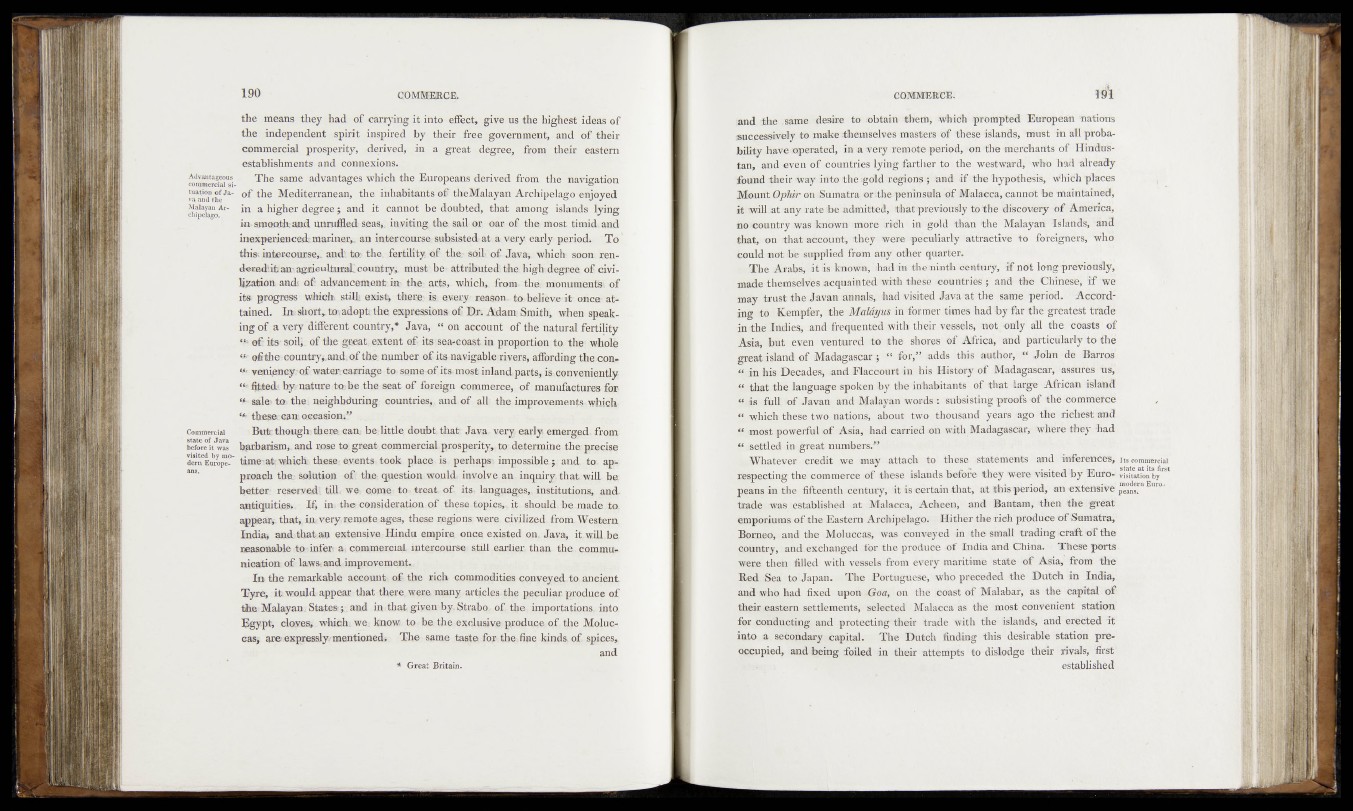
Advantageous
commercial si
tua^on of Java
and the
Malayan Archipelago.
Commercial
state of Java
before it was
visited by modern
Europethe
means they had of carrying it into effect, give us the highest ideas of
the independent spirit inspired by their free government, and of their
commercial prosperity, derived, in a great degree, from their eastern
establishments and connexions.
The same advantages which the Europeans derived from the navigation
of the Mediterranean, the inhabitants of theMalayan Archipelago enjoyed
in a higher degree ; and it cannot be doubted, that among islands lying
in- smoot-frand unruffled seas,, inviting the. sail or oar of the most timid, and
inexperienced;mariner,, an intej:co:uxse.sub.sistedtat.a very early period-. To'
tbit* intercourse,, and tec the. fertility Q? tbsv Sftih o£ Java-,, which: soonx ree.
dered'iham agrieufruraf country,', must be- attributed^ the. high; degjjeo. of civilization
ands of: advancement in- the.- arte» which*- from, the; monuments» of
it® progress which» stills exists there.' is. every reason, to» believe- it- onces attained.
Im short,, tor adopt the expressions of B n Adam Smith* when speaking
of, a very different country,* Java, “ on account of the natural fertility
o f its- soil}, of the great, extent of its sea-coast in proportion to. the5 whole
‘a ofi the o©un±ry,.and. of the; number of its navigableirivers, affording thncnft_
m veni^ncyrof watorcQajffiage tOiSfune-ofitSfinosts inland,part% ismonveniently
fitted! hyf’nature-ta>he the seat of foreign commerce, .©ffmanufactnres fro?
sale? to the. neighbduring. countries, , and-of alb the improvements,which.
** tbftsa cam occasion»” ,
Bute though; there, can? belittle doubt thah Java, very early emerged, front
barbarism,, and nose to. great Gommercial-pnosgerity,. to: determine the:precise
time'at which these; events - took place is perhaps? impossible. and. to. apg
proacb the;- solution of: the question, vwuld»involve, an. inq|ifry* that:wiU. be
better: reserved?. tdb we. opine- to- treat, of- its? languages,, institutions, and.
antiquities,. I f in? the? consideration,of these topics», it., sh.ould. be .ma(le ,to,
appear*. that, im veryremote-ages, these regionswere, civilized, from.Weatern.
India} and:that.an extensive Hindu empire once existed on. Java; itwill.be.
reasonable to'inferi a? cowuereiaf intercourse; still earlier, than the. communication
of lawsmndimprovcment..
Io the rematkahle account* of the rich commodities conveyed,.to, ancient
Tyre, it: would appear that there. were n®ny articles .the peculiar produce of
the Malayan, States; ;:, and in that given by, Sfraho, of the, importations, into.
Egypt, cloves, which, we- know to-be; the exclusive! nrodimu of the Moluccas;
are expressly mentioned. The same taste for the-,fipe kinds., of spices,.
and
Great Britain.
;and the samedesine to obtain them, which prompted European nations
successively to make Aemselwes -masters o f ‘-these islands, must in all probability
have ruperated, in a very romiiite -on the merchants of Hindustan,
and- even bf'-coun tries lying farther toithe westward, who had 'already
found their way atfto ithe gold regions ; and if 'the hypothesis, wbidh places
Mount Ophir on »Sumatra or ithe peninsula of Malacca, cannot ‘be maintained,
it -will jait .any rate he admittoJI, rtratpreviou&ly to the discovery of America,
no country was known more iritih in -gold than ’the Malayan Islands, and
that, on that account, they Were ^peculiarly »attractive to foreigners, Who
could mot she supplied from any other quarter-.
nrh» .Arabs, it 5s known, had in d}e:?niHlh.-.centUry, -if not togpreriottsly,
made tbemsdves iacquainted fwitih fchesk-countries;; and -the Chinese, if -we
may trust ihe Javan annals, had visited J&va'at~tbe sarnie period. According
-.to Tfempfer, the Malayus in former times ha&hy far -thé -greatést trade
in the Indies, and frequented with their vessels, net -only all the coasts of
Asia, hut even ventured to ithe shores ©£ Africa, and particularly tb -thé
great island of Madagascar; for,” adds this author, gjj Joh« de Barros
« in his.'Decades, .and Elacoourt in his History --of MadugaBc«-, us»fès i»,’
« that the language spoken by the i-ffhabitants- of that large African island
« is full .of Javan and Malayan words-: subsisting proofs of the commerce
“ which these .two .nations, about>typ_ thousand years »ago the richest and
« most powerful -of Asia, had carried on w-ith Madagascar, wherfe they had
“ i ssettled hi great numbers.0 | -
Whatever -eteiit we may attach to these statements ahd inferences,
rejecting the commerce o f these islands before they were visited.-by Europeans
in the fifteenth century, it is certain that, at 'this period, am -extensive
trade was established at Malacca, Acheen, and Bantam, ’then the great-
emporiums of the Eastern Archipelago. : ffithcr the rich produce of Sumatra,
Borneo, aud the Moluccas, was conveyed in q.he small trading craft of the
country, and.exehanged for the ptodnoe rOf India and China. These ports
were then filled with vesselsfeo® every maritime sta&fe-of Asia, from the
Red Sea to Japan. The Bcsrtugueee, who preceded the Butch in India,
and who had fixed upon >Goa, on the noast of Malabar, as the capital o f
their eastern settlements, selected Malacca as the - most convenient station
for conducting and proteoting their trade with the islands, anderCeted it
into a secondary capital. The Dutch finding this desirable station preoccupied,
and being foiled in their attempts to dislodge their rivals, firsts
lafen-rt : I established
Its commercial
state at its first
•visitation by
modern Euro-
peans.